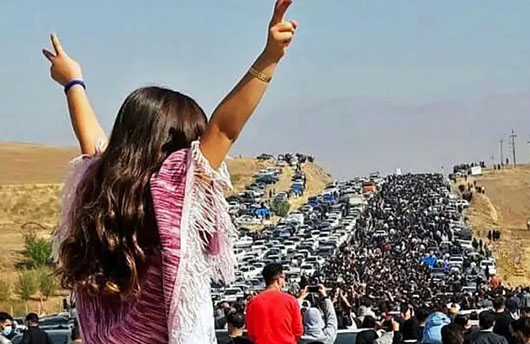by WorldTribune Staff, December 6, 2022
Protests sparked by the alleged killing of 22-year-old Jina ‘Mahsa’ Amini have spurred Iran’s ruling clerics to reportedly soften their strict enforcement of the law requiring women to cover their heads in public.
Iran has decided to disbanded the so-called morality police, Attorney General Mohammad-Jafar Montazeri said, adding that the law requiring veils, known as hijabs, was under review by Iran’s Parliament and judiciary.

On Sept. 13, Amini was arrested by Iran’s morality police for “improperly” wearing her hijab, and according to her family and local media, severely beaten. She died three days later while still in police custody.
A decision to formally disband the morality police would likely involve supreme leader Ali Khamenei, who has strongly defended mandatory hijab in recent years, and the Supreme Council of the Cultural Revolution, a government panel appointed by Khamenei that created the police force.
“The people’s problem with the Islamic Republic is not only the hijab,” said Azam Jangravi, who was jailed in Iran for protesting against the veil, and now lives in Canada. “Even if they remove the hijab, the people want regime change.”
It is unclear if Montazeri’s comments reflect a high-level decision by Iran’s rulers to make significant changes in the system of enforcing the hijab law or if they are temporary overtures aimed at helping to suppress the protests, analysts said, according to a report by the Wall Street Journal.
Atena Daemi, a civil-rights activist in Teheran, said the morality police have been less visible in enforcing the hijab law since the protests began. She added that if the protests died down the government was likely to resume using the police or create another mechanism to pressure women to publicly cover their heads.
“They will continue to deal with those who do not wear the Islamic hijab,” Daemi said, adding that she didn’t believe the claims that the morality police have been disbanded.
Iranian President Ebrahim Raisi said Iran’s Islamic system was enshrined in its constitution, but added, “There are methods of implementing the constitution that can be flexible.”
Protests continued in Mahabad and Bukan, cities in Iran’s Kurdish region, with fires and road blockades, according to Hengaw, a Kurdish human-rights group based in Norway.
Montazeri said that recommendations for changes in the hijab law would be made later this month. “We are working on the issue of hijab quickly and trying to employ a wise solution,” he said.
Montazeri said the disbanding of the morality police, a force established in 2005, had been made by a committee of government officials but provided no other details. He said the country’s Islamic courts would continue to monitor public behavior, according to media accounts of his remarks.
“They are probably tired and think some small superficial concessions like this will quell the uprising against them,” said Mahsa Alimardani, a senior researcher at London-based Article 19, a human-rights group. “This move certainly won’t stop protesters or appease those chanting for complete regime change.”
Action . . . . Intelligence . . . . Publish
